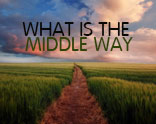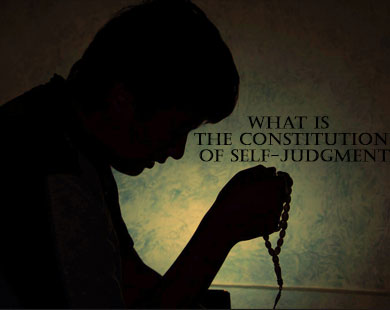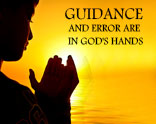WHAT IS THE MIDDLE WAY?
1. 'Conferring' as opposed to 'fatalism'
Of course, opposing the belief in fatalism, which is one kind of an extreme, is the school of 'conferring', which is at the other extreme.
Those who accept this school believe that God created us and then put everything at our disposal and that, in general, He is not responsible for anything that we do and in this way, we are completely independent in choosing what we do.
Doubtlessly, this belief does not agree with monotheism because monotheism has taught us that God rules all of the world and nothing is beyond His control. Even our free will and free choice cannot be beyond His realm, otherwise multitheism would, of necessity, result.
In other words, we cannot believe in two gods, one, the great Creator of the universe and the other, a small one who is the human being who is free to do whatever he or she wishes, completely free and independent and even God cannot affect what he or she wishes to do.
This is multitheism. This is duality and polytheism. What is important is that we know human beings have freedom of choice and free will at the same time that we know God to be the Ruler over all persons and deeds.
2. The School of the Middle Way
The fine point to recognize here is that we do not imagine that there is a contradiction between the two. The fact is that we both accept God's justice as well as the freedom and responsibility of His servants as well as unity and His rule over the entire universe of existence and this is that very thing which is known as the 'middle way' (something which is between two extremes).
Let us clarify this with an example as the issue is a very complicated one. Let us assume that you are traveling on an electric train and you are the driver of the train. A strong electric cable has been placed along the line of the train and the train is connected with a link to this electric cable and moves and moment after moment the electricity is passed to the locomotive in such a way that if for just one moment, the electricity to the locomotive stops, the whole train will stop.
Without doubt, you are free. You can stop wherever you want and you can move at your own speed. But in spite of all of this freedom, the person who is sending the electricity can, at any moment, make you stop because all of your power and strength is that very electricity and he holds the key.
When we note this example with care, we see that even though one has such freedom, choice and responsibility, one is completely at the disposal of the power of another and these two do not contradict each other.
Another example:
Assume that the hand muscles of a person as the result of illness or the occurrence of an unforeseen event, do not work and he does not have the power to move his hand but if we connect that to a very small amount of electricity, the nerves will be warmed and become capable of movement.
Whenever such a person commits a crime with that hand, for instance, and in that very state, strikes another person in their face, strikes a knife in an innocent person, it is clear who the person responsible is because he both had the power and the choice and a person who has will power is responsive for what he does.
But at the same time, that person who gives his hand electricity and creates his power and strength, rules over him and while he is free and has a choice, he is in his grasp.
Now let us return to the main point.
God has given us physical power or strength and from moment to moment, it continues and if it is cut off for even a moment, and our connection with Him be cut off, we would be destroyed.
If we can do anything it is because we have strength which He has given us and it continues moment by moment and even our freedom and choice is also from Him. That is, He willed that we be free and by making use of this great Divine kindness, one can transform one's self.
Thus, at the same time that we have free choice and a free will, we are in His grasp and we will never move beyond His realm. At the same time that we have strength and power, we are dependent upon Him and without Him, we will be destroyed and this is what 'the middle way' means because neither have we recognized any creature to be equal to God, which would bring multitheism nor do we believe creatures are obliged to act as they do which would bring oppression.
We have learned this lesson from our pure Imams, peace be upon them. Whenever they were asked, "Does anything exist between fatalism and conferring?" They said, "Yea. More extensive than the distance between heaven and earth." (See Usul Kafi, vol. 1, p. 121)
3. The Holy Quran and fatalism and free choice
The Holy Quran states this issue directly and proves the free will of human beings and there are hundreds of verses which talk about free will.
a. All of the verses which relate to commanding virtue and preventing vice are all proof of the free will of human beings because if a person were obliged to do so, doing so would make no sense.
b. All of the verses which speak of blame and reproach against the evil doers and praise for the good doers are proof of free will because if one was obliged to do whatever one did, blame or praise would make no sense.
c. All of the verses which speak about the questioning on the Day of Judgment and the Judgment in that Court and then the rewards and punishments and heaven and hell are proof of free will because if one were to assume that everything was predestined then questioning, judging, rewards and punishments would all be oppressive.
d. All of the verses which say that a human being is responsive for his or her deeds:
﴾Every soul will be (held) in pledge for its deeds. (74:38)﴿
﴾(Yet) in each individual in pledge for his deeds. (52:21)﴿
e. Verses like,
﴾We showed him the Way. whether he be grateful or ungrateful (rests on his will). (76:3)﴿
﴾But you will not except as God Wills... (76:30)﴿
* LET'S LEARN ABOUT DIVINE JUSTICE. By Nasir Makarim Shirazi.




















